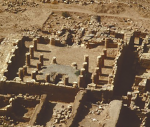You are here
Jerusalem and the clash of politics in the Middle East
Dec 20,2017 - Last updated at Dec 21,2017
Known as Al Quds in Arabic, Jerusalem is one of the most ancient cities in the world. The Muslim Dome of the Rock (where Prophet Muhammad ascended to heaven) and the Al Aqsa Mosque are one of the city’s and Islam’s holiest sites. Israel, the sad reality is, claims that all of Jerusalem is its capital, while the Palestinians, on the other hand, rightly believe that the city’s eastern sector, occupied by Israel in the 1967 war, as the capital of a future independent state. While Israel controls the city, the annexation of East Jerusalem is not internationally recognised.
For US President Donald Trump, the status of Jerusalem was always more of a political imperative than a diplomatic predicament. Most international leaders believed the move was reckless and self-defeating. US Secretary of State Rex W. Tillerson and US Defence Secretary Jim Mattis worried about anti-American blowback, not least to diplomats and troops serving overseas.
By relocating the US embassy, Trump has endorsed an illegal occupation of Arab Jerusalem even though the sovereignty of Israel over the occupied city has never been recognised by the international community because its occupation violates international law. And by doing so (by endorsing an illegal situation which is the Israeli control over the city calling it its capital), Trump is no longer committed to peace, nor is he a moderate broker. And thus, the saga of the two-state solution becomes so far-fetched a story beyond any stretch of the human imagination.
Occupation of the land is what makes any dialogue unrealistic and non-factual, if not absurd. A political solution to the question of Palestine would definitely allow more room for religious tolerance. A sound “political” compromise would essentially aid in effecting religious harmony in the entire region.
This highly complex in-demand situation has led to new awareness of America’s global preeminence that has hardly moved beyond a typical discourse of exceptionalism or supremacy obliterated by the national security priorities or demands. This imperialism notion is pushed to its furthest possible extremes under Trump! From an imperialistic standpoint, other countries are denied control over their own land and their sovereignty becomes bitterly questionable, if not absent! American exceptionalism is what makes the US imperial power biased, let alone other problematic issues that come with it such as racism, prejudice and chauvinism.
Nations should build bridges instead of walls and their differences are not cultural, nor are they religious. They are political, and the political issues are at the core of the matter that at once needs to be instantly investigated, to reach a fair, just understanding of humanity at large and reconsider the ways in which the land of exception and the land of the American dream and success would prohibit, rather than support, the creation of any kind of exceptionalism, supremacy and imperialism — it is to be hoped!
Marwan M. Obeidat is professor of American culture at the Hashemite University. He contributed this article to The Jordan Times.














